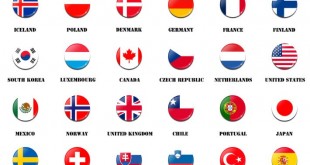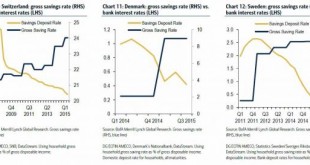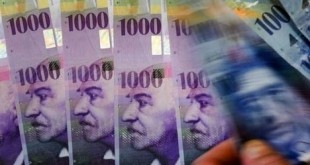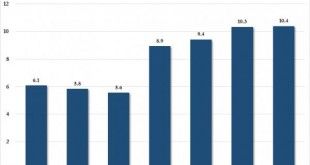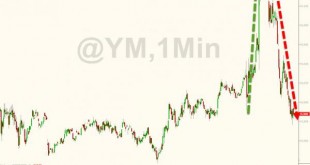Hold your real assets outside of the banking system in a private international facility --> http://www.321gold.com/info/053015_sprott.html USA: The New Switzerland? Written by Jeff Thomas (CLICK FOR ORIGINAL) At one time, tax havens took great pride in calling themselves just that, since low-tax jurisdictions provide people with freedom from oppressive taxation. But, in recent decades, the...
Read More »The Global Run On Physical Cash Has Begun: Why It Pays To Panic First
Back in August 2012, when negative interest rates were still merely viewed as sheer monetary lunacy instead of pervasive global monetary reality that has pushed over $6 trillion in global bonds into negative yield territory, the NY Fed mused hypothetically about negative rates and wrote "Be Careful What You Wish For" saying that "if rates go negative, the U.S. Treasury Department’s Bureau of Engraving and Printing will likely be called upon to print a lot more currency as individuals and...
Read More »Swiss Politicians Slam Attempts To Eliminate Cash, Compare Paper Money To A Gun Defending Freedom
As we predicted over a year ago, in a world in which QE has failed, and in which the ice-cold grip of NIRP has to be global in order to achieve its intended purpose of forcing savers around the world to spend the taxed product of their labor, one thing has to be abolished: cash. This explains the recent flurry of articles in outlets such as BBG and the FT, and op-eds by such "established" economists as Larry Summers, all advocating the death of cash, a process which would begin by...
Read More »Swiss Politicians Slam Attempts To Eliminate Cash, Compare Paper Money To A Gun Defending Freedom
As we predicted over a year ago, in a world in which QE has failed, and in which the ice-cold grip of NIRP has to be global in order to achieve its intended purpose of forcing savers around the world to spend the taxed product of their labor, one thing has to be abolished: cash. This explains the recent flurry of articles in outlets such as BBG and the FT, and op-eds by such "established" economists as Larry Summers, all advocating the death of cash, a process which would begin by...
Read More »Swiss inflation: in negative territory, but no sign of a deflationary spiral
Despite the deeply negative inflation rate, the SNB has become somewhat less sensitive to persistent undershoots of its inflation target. According to Swiss Federal Statistical Office, consumer prices in Switzerland remained broadly stable at -1.3% y-o-y in January, in line with consensus expectations and thus marking the seventeenth consecutive month in negative territory. Core inflation (headline CPI excluding food, beverages, tobacco, seasonal products, energy and fuels) was stable at...
Read More »The Swiss National Bank Doubled Its Apple Holdings in 2015
In the spring of 2015 we showed something unexpected: one of the biggest buyers, and holders, of AAPL stock was none other than the already quite troubled – in the aftermath of its disastrous Swiss Franc peg which ended up costing it tens of billions in losses – largest hedge fund in Switzerland, its central bank, the Swiss National Bank. What is curious is that unlike the Fed, the hedge fund also known as the Swiss National Bank not only proudly admits it purchases stocks, ETFs and...
Read More »BoJ Adopts Negative Interest Rates, Fails To Increase QE
Well that did not last long. After initial exuberance over The BoJ's wishy-washy decision to adopt a 3-tiered rate policy including NIRP, markets have realized that without further asset purchases (which were maintained at the current pace), there is no ammo to lift stocks. An almost 200 point surge in Dow futures has been erased and Nikkei 225 has dropped 1000 points from its post BOJ highs... Dow futures have plunged... What a mess... And Nikkei has crashed over 1000 points... And...
Read More »SNB’s history of balance sheet and Monthly bulletin
Since 2015, the SNB provides its balance sheet items in a different form. Previously the monthly bulletins provided a history of the balance sheet. The last monthly bulletin appeared for August 2015. It contained all important data of the SNB and the Swiss economy. The balance sheet data is often 2 months or older. The weekly monetary data and the IMF data about FX reserves and more are published a lot more quickly, but they are not that complete like the monthly bulletin. SNB...
Read More »Diverging Toward Europe and Switzerland
December could be a big month for central bankers. The Federal Reserve is expected to make its first rate hike in nine years on December 16, while the European Central Bank is expected to announce further easing measures on December 3. The Swiss National Bank is likely to follow the ECB’s footsteps, sending deposit rates in the country even further into negative territory. Those moves, particularly combined with the divergence from American monetary policy, should provide a boost to European...
Read More »SNB & CHF, the blog on a beleaguered central bank, its currency, on gold and astute investments
Over four years our association of supporters of Austrian Economics from Switzerland, Germany and Austria and helpful hands from all over the world expressed opposition against the CHF cap in in-numerous pages. Finally the SNB agreed to the wishes of Swiss consumers and gave up the cap that effectively represented a tax on consumption and extra-profits for companies and close friends of the central bank. Swiss Inflation Watch: Swiss inflation As monetarists & Austrians we expect Swiss...
Read More » Swiss Economicblogs.org
Swiss Economicblogs.org

